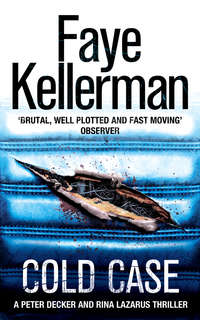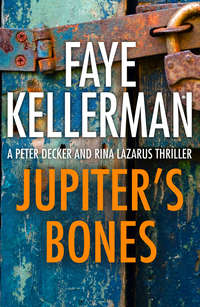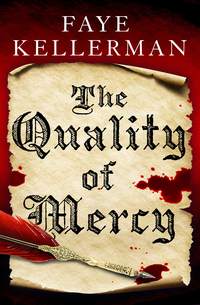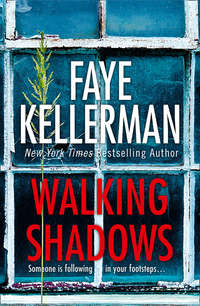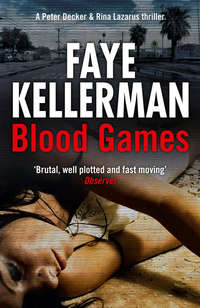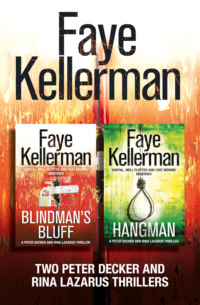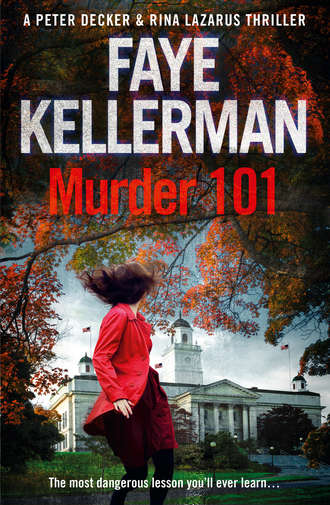
Полная версия
Murder 101
Finally, the meal could begin in earnest: soup, salad, rib roast, lentils with red peppers and onions, green beans with hazelnuts, and mixed berry cobbler for dessert. It was enough to break the zippers and pop buttons on any waistline. There was lively conversation between the students and Rina as they discussed the parashat hashavua: the weekly chapter of bible. The kids were intelligent and opinionated. McAdams, on the other hand, was quiet. Like a lot of secular, upper-crust kids of his generation, he was probably scripture impaired. But he was polite and spoke when he was spoken to.
By nine o’clock, things were starting to wrap up and that’s when Decker’s landline rang. Rina and he exchanged glances. Decker’s father had died a year ago, but his mother was still alive and in her nineties. Rina’s parents were both in their nineties. Whenever they got a phone call on Shabbat, it was a reason to worry. Decker held up his finger and went to the answering machine, which identified phone numbers. “It’s local.”
“Thank God,” Rina said. “Probably a robocall.”
The voice kicked in. It was Mike Radar and Decker picked up the phone. “It’s Decker. What’s up, Captain?” He listened intently over the phone. “When? … Okay … okay.” He checked his watch. “Does he know when the lock was broken? No idea? All right, I’ll look into it. Do you know how far it is from my house? … no, I’ll handle it. Just tell me how to get there on foot … no, I don’t mind walking if it’s not too far. A mile away is no problem, Mike … no, really, you stay put. I just ate the equivalent of half a cow and it would be good for me to get a little exercise. Unless it’s something more, I’ll call you on Sunday.”
Decker hung up the phone. “There was a break-in at the local cemetery and the watchman is all up in arms. The other detectives are ice fishing in Canada for the weekend so the captain wondered if I wouldn’t mind handling it.”
Rina feigned mock outrage. “You mean your colleagues didn’t invite you with them?”
Decker grinned. “Actually, I made the cut, but I declined. Maybe next time.”
McAdams said, “I would have gone. Nobody asked me.”
“They probably thought your blue blood couldn’t handle the cold.” Decker sighed inwardly. He had to make the offer to look like a good guy. “Come if you want.”
“Of course, I’ll come.”
“Take the car. I’ll meet you there in about a half hour.”
“I’ll walk with you, Old Man.”
“Harvard, it’s really cold outside. I’m doing it for religious reasons. No reason for you to suffer.”
“I’m not gonna let you outmacho me.”
“Suit yourself. Let me grab a few things and we’ll be on our way.”
“I’ll get your jacket, Tyler,” Rina said.
“Thanks.” McAdams jammed his hands into his pants pockets. His eyes were darting back and forth and he walked in itty-bitty circles. When Rina brought over his outerwear, he bundled up and then forced a smile. “Thank you for dinner. It was delicious.”
“You’re welcome.”
“Do you want some package warmers for your feet and hands?” Decker asked. “I’m taking some with me. No sense getting frostbite.”
“Yeah, sure.”
Decker gave a wave and he and the kid were off. The night was moonless with thousands of stars sprinkling the dark sky like salt on black velvet. Without the cloud cover, the temperature had dropped to the teens. No wind … just cold air and the mist of warm breath wafting through darkness.
McAdams said, “Thanks for dinner.”
“You’re welcome. It was my wife’s idea.”
“Yeah, I intuited that. She is a good cook. She’s also lovely … I mean personality.”
“She’s lovely all the way around. I’m very lucky.”
McAdams said, “You have a large family. I counted like seven different people my age in the various pictures.”
“Five kids, two spouses, twin grandsons, and a granddaughter.”
“Wow.” A pause. “I take it the black guy is a son-in-law? Or maybe you were married before.”
“I was married before, but not to Koby’s mother. He’s married to my elder daughter, Cindy, who’s a cop in Philadelphia. Koby is in medical school at the University of Pennsylvania. They have twin boys. The older two white boys are my stepsons. The girls are my biological daughters and the youngest kid is our foster son who’s been with us for the last four years. He is a classical pianist who just graduated from Juilliard.”
“Impressive. What do the other kids do?”
“Sam and his wife are both doctors. They have Lily. They live in Brooklyn. Jacob—the one who looks like Rina—just finished his Ph.D. in public policy. He’s still …” Decker laughed. “He’s still finding himself. My other daughter, Hannah, is in a Ph.D. program at the Ferkauf School of Psychology in New York.”
“Not bad … but no Crimson.”
“Yeah, you Harvard guys think that there’s only one school in the world.”
“No, we do accept Princeton or Yale. But that’s about it.”
Decker smiled. “What about yourself, McAdams?”
“What do you mean?”
“Parents, brothers, sisters, city of birth? For as much as you yap when we’re driving, I don’t know anything about you.”
“Nothing much to tell. I grew up in the city. By the city, that means Manhattan. My parents divorced when I was ten, and both of them were remarried by the time I was fourteen. A couple of half sibs, a couple of stepsibs, all of them younger and none of them as smart as I am. I don’t have much of a relationship with any of them.”
Talking about family was obviously painful for him so Decker didn’t ask any more questions. They walked the next ten minutes in silence until the local graveyard came into view. That was another thing about small towns. Cemeteries were right in your face, not like L.A. where they’re situated in no-man’s-land off the freeway. This one was several blocks of upright headstones with a secluded, gated portion for the mausoleums: domed structures with fluted columns. Since the captain had mentioned something being broken into, it had to be one of the crypts.
Decker said, “Do you want a hand or foot warmer package? My feet are ice at this point.”
“Yeah, sure.”
After handing him the packets, Decker took a couple for himself, broke them in half, and dropped them into his snow boots. “Ah … better. I’m not really cold—after eating that much meat you can’t be cold—but my hands and feet get numb.”
“Why did you insist on walking? Surely there’s some religious dispensation that allows you to drive the car when working.”
“Yeah, I could have taken the car. Probably would have been smarter. What can I say, McAdams? Without a Harvard B.A., I guess I’m just handicapped.”
The watchman was a dead ringer for Ichabod Crane with a long face and extended skeletal frame and sunken eyes unsuitable for daylight. Any minute, Decker expected to see the headless horseman. His given name was Isaiah Pellman and his family had been living in Greenbury for two hundred years. The history was given by way of introduction to his good character. There were a lot of loquacious people in Greenbury as well as a lot of odd ducks. Eccentrics were everywhere in the world, but they were more noticeable in smaller populations.
They were chatting while standing between rows of headstones. Pellman said, “I check the Bergman crypt all the time, so I was really surprised when this happened.”
Decker pulled out a notebook. “What specifically happened?”
“My key doesn’t work the lock: that’s what happened.”
“Okay … so the lock wasn’t broken off?”
“No, it was broken off and exchanged for a different lock.”
“And your key always worked the lock before?”
“Yes, sir, it did.”
“Are you sure the lock just didn’t freeze?”
“I’m sure. First thing I did was heat it and oil it. The key goes in, but the tumblers don’t move. Everything worked perfectly four days ago. I called up the family and explained the situation a few hours ago. They told me to cut the lock and make sure everything inside is okay. But I told them I was gonna call the police. So I called the police. And now you’re up to date.”
“Who does the crypt belong to again? Bergman?”
“Ye-ah. They’re all buried inside—Moses and Ruth and their three children, Leon, Helen, and Harold along with their spouses—Gladys, Earl, and Mary. Ken Sobel’s the one I deal with. He’s a grandson from Helen Bergman, who became a Sobel when she married Earl. Ken’s older cousin, Jack Sobel, was buried here around six months ago. He was seventy-three.”
The man knew his local history. “How old is the crypt?”
“Erected in 1895.”
“And the family visited the crypt for a funeral about six months ago?”
“Ye-ah. Then Ken Sobel came back in the fall. Ken’s in his late sixties. He comes down four times a year as regular as clockwork. And he always makes sure the lock’s on tight.”
“So he has a key.”
“He does. Others as well but they don’t come down.”
“Could Ken have changed the lock?”
“No, sir, I asked when my key wouldn’t work. And he said no, he didn’t change the lock. And he’s the one who’s in charge. He told me to break the lock and make sure everything’s okay inside. So that’s when I called you—the police.”
“Anything of value inside the crypt?”
“No. Unless the bodies were buried with jewelry.”
Decker said, “Jewish custom is not to bury bodies with anything material.”
“So there you have it!” Pellman exclaimed.
“Indeed,” Decker said although he really wasn’t sure what Pellman was talking about. “Has this ever happened before? That your key didn’t work the lock?”
“No, sir, not on my watch.”
During the interview, McAdams’s toe was constantly tapping. Finally, he said, “Why don’t we just go and see what’s going on? If everything looks fine, we can all go home.” He looked at Pellman. “Well, not you, but I’m not getting paid to freeze my ass off.”
Decker was annoyed, not just at the kid’s rudeness, but at the disruption of the interview. He always collected as much information as possible before he witnessed the crime scene … if there even was a crime scene. “Mr. Pellman, do you have anything else you want to tell me before we look around?”
“No.” The man was stunned. “Should I be telling you something?”
“It wasn’t a trick question,” McAdams said. “No is a perfectly acceptable answer.”
“Take your time, Mr. Pellman,” Decker said.
“No, nothing else.”
“Okay. Thanks.” Decker folded his notebook. “Do you have a pair of bolt cutters?”
“I do.” He shuffled his feet and didn’t move.
“Could you get them for me?”
“Uh, sure. I don’t know if they’re strong enough to cut the lock.”
“Only one way to find out.”
Pellman said, “I guess you’re right about that.” Slowly he headed toward a shed that sat about two hundred yards away.
“Queer old guy but then again they’re all odd over here.”
Decker turned to the kid. “Don’t interrupt when I’m interviewing. It distracts me.”
“Just trying to move things along.”
“Tyler, this is probably nothing, so it’s no big deal. But if you have a chance to investigate a real crime, you can’t rush it along. You’ll miss things. You’ve got to slow down.”
Before McAdams could respond, Pellman came back with the bolt cutters and handed them to Decker. “You want to see the crypt and the lock?”
“That would be helpful.”
Slowly Pellman took them over to the Bergman crypt, an enormous rectangular stone vault with a dome ceiling. Each of the four outside walls hosted a leaded glass window that would have lit up the interior had it been daylight. Five stone steps led down to a padlocked concrete door. No foul odors seemed to emanate from the ground, but it was so cold that everything was frozen solid including dead matter. Decker looked at the bolt cutters and looked at the thin shank of the padlock, something that teens would use on their school lockers. With a little muscle, he should be able to make a clean cut through the U-shaped metal.
Decker said, “Can I try your key just to make sure?”
“Sure.”
Decker inserted the Schlage into the key slot. He could move it a millimeter to the left and right. The insides didn’t appear to be frozen, just that the key didn’t work the lock. He handed it back to Pellman. Then he handed the cutters to McAdams. “Go ahead, Harvard.”
“Me?”
“Yeah, take a whack at it.”
McAdams threw dagger eyes, but he secured the blades of the cutter around the U-shaped metal. “Okay.” He took a deep breath. “Okay.” He pressed down hard and the lock slipped under the blades. McAdams swore.
“If you don’t get it on three, I’ll do it,” Decker told him.
“Chill, Old Man. I’ll get it, I’ll get it.”
Number three was the charm. The kid used all his muscle, the blades cut through the shank, and the lock snapped off. When McAdams started to go in, Decker held him back.
“How about if we pick up the lock from the floor and stow it in the paper evidence bag. Just perhaps there is a crime scene involved and maybe the lock has a fingerprint. And as luck would have it, I just happen to have a few bags in my pocket.” Decker handed him a small paper bag. “Or would you prefer that I pick it up, boss?”
McAdams swore, but he bent down and picked it up with his gloved hand.
Decker said, “Place it in the bag. Then you write your name, the date, the time, and the location.”
McAdams did as he was told then gave the bag back to Decker. “Only because your wife fed me.”
“And fed you well.” Decker took out a flashlight and a magnifying glass. He peered through the lens and studied the door. “No pry marks.” He pushed the door open and swept the beam across the crypt. There were a number of horizontal marble headstones in the ground, but no bodies that weren’t six feet under. Decker counted the marble tombstones. At current, the crypt was hosting ten graves with room for more. Decker handed McAdams an extra flashlight. “In case you didn’t bring one. Keep it.” He turned to Pellman. “Could I borrow your light? It’s stronger than mine.”
“You betcha.” The watchman handed him his battery pack.
“Thanks.” Decker crossed over the threshold and stepped inside. The temperature wasn’t as cold as he thought it would be. Thick walls kept out the sunlight and heat but they also kept out the extreme cold. Decker swept the beam around to get the lay of the land.
The space was as big as his current living room, around two hundred square feet, and beautifully adorned. There was carved molding on the ceiling, and jeweled stripes of iridescent colored glass tiles were inset into the walls. Each gravestone was marked by the inhabitant inside—name, beloved husband/wife father/mother, grandfather/grandmother/date of birth/date of death. Nothing unusual except that the headstones of the matriarch and the patriarch were inset with tile work—two different pastoral scenes elegantly laid out in tiny pieces of glass mosaic. He squatted down to study the artwork. McAdams kneeled next to him. Decker whispered, “Doesn’t matter now, but for the record, don’t kneel. It might mess up something. You want as little contact with the ground as possible.”
McAdams squatted. “Not only am I a solid chunk of ice, I’m gonna be sore.”
Decker ignored him. “Nice tile work, no?”
“It’s okay … actually more than okay. It’s done well.”
“Somebody put money into these headstones.” Decker stood up and inched the light up and across the walls until he reached the windows. They stood about ten feet above the floor. Hanging just under the dome in the upper four windows were stained-glass panels. Decker didn’t notice them when he first came in because it was dark. He illuminated each panel with his flashlight, letting the beam rest on each for a minute or so before moving onto the next one. They probably sparkled beautifully in the daylight.
“It’s the four seasons.” Decker turned to McAdams. “See, that one’s winter, that’s spring, and summer and autumn.” He regarded the kid. “I think they were custom made.” He turned to Pellman. “Have those stained-glass windows always been inside the crypt?”
“For as long as I’ve been here and even before.”
Decker turned to the kid. “What do you think?”
McAdams shone his light on the four panels. “My mother has some Tiffany lamps. I’m not saying they are Tiffany, but it looks like good quality.”
“Agreed,” Decker said.
“You do know that the company made stained-glass windows for religious purposes.”
“Go on.”
“Just that the studio made a lot of devotional items for churches and synagogues. Do you know Manhattan at all?”
“Not too well.”
“There’s a famous synagogue on Fifth Avenue that has an original Tiffany. As does the Portuguese synagogue on the west side.”
“Courtesy of your ex-Jewish girlfriend?”
“You have a honed mind, Old Man. The studio also made windows for wealthy people’s mausoleums. So if they were real, I wouldn’t be surprised.”
“Could you tell if those are Tiffany or not?”
“Not at this distance. You could look for a signature, but that can be forged. It happened all the time. Mostly you tell by quality.”
Decker turned to Pellman. “Do you have a ladder?”
“Not on me, but I can get you a ladder.”
“Thank you. That would help.”
“Be right back.”
After he left, McAdams said, “Why in the world are you climbing up there? Are you that bored with the job?”
“Harvard, it always helps to get up close and personal. I’ll do the climbing, you just hold the ladder.” The two men didn’t speak. McAdams was fidgety. Decker said, “You okay?”
“Kinda creepy in here.”
“Yeah, cemeteries are a little spooky.” Decker paused. “Not this place, though. Someone took the time to make it pretty.”
Pellman came back with the ladder. “Here you go.”
Decker handed him his big, bulky battery pack flashlight and took his smaller light. He started climbing toward the windows. “Guys, shine the lights on the window, okay? I want to see them up close.”
The two men focused the light on the “autumn” stained-glass window. It was about fourteen by twenty inches in size and was hanging from two chains that were hooked into the ceiling.
“Is there a signature?” McAdams shouted.
“What kind of signature should I look for?”
“Tiffany Studios … something like that.”
Decker was face-to-face with the artwork. He shone his light through the colored glass. He wasn’t an expert, but it looked pretty good to his eye. It took him a few seconds to find the signature: Tiffany Studio. New York.
“Do you think it’s real?” McAdams asked from below.
“No idea.”
McAdams said, “There must be someone in one of the colleges who could authenticate it.”
“Good thinking.” Decker continued to study the work: each cut piece of glass, each thread of metal that held the glass into place. All the metal, including the frame, was dark bronze in color but with a hint of dark green peeking through. He knew from watching those antique shows that the patina—the way the metal aged over time—was important in authentication and to his eye, the metal work between the glass pieces and frame had plenty of patina. So did the chain from which the panels hung.
All the links had plenty of patina except for the two metal loops soldered to the frame and attached to the hanging chains. Those two loops were darker than the frame and looked flat when compared to the rest of the metal. Decker saw a raised chip of what he thought was a metal shard poking up, but when he touched it, dark paint flicked off and fell onto the back of his hand. Carefully, he climbed down the ladder and folded it up. “Uh, with the family’s permission, I’d like to get an art expert down here to look at all four windows.”
McAdams said, “Why? What did you find?”
“I’m not sure, but I’d like someone to take a closer look.”
Pellman shuffled his feet. “I suppose I can call up the family.” He hemmed. “Maybe it would sound better if it came from the police.”
“I’d be happy to call them up and tell them my thoughts.” Even in the dark shadows, Decker could tell that Pellman was relieved. The watchman gave Decker Ken Sobel’s telephone number. “Do you have something to secure the door with?”
“No, not on me.”
“I don’t suppose there’s a hardware store open at this time of night?”
Pellman said, “Just call up Glenn Dutch. I’m sure he has something around his house. If not, he’ll open the store for you.”
McAdams said, “Dutch’s Hardware is on Gable Street.”
“Do you have the number?” Decker asked Pellman.
“I don’t have it, but Roy might have it. Roy’s a friend of Glenn’s and I have Roy’s number.”
“Could you get Glenn’s number from Roy, then?”
“Surely, I can.” He checked his contact list on his phone. “I must have it at home … Roy’s number. I’ll call up my wife and she can get me Roy’s number who can get you Glenn’s number.” Pellman walked a few feet away to make his calls.
McAdams said, “You want to tell me what you found or are you going to make me play twenty questions?”
Decker said, “I found paint.”
“Paint?”
“Paint flicked off on one of the loops soldered onto the frame. It was painted to make the solder joints look old. And, come to think of it, whoever put those loops on the frames did a sloppy job of soldering. Now it could have been a recent repair. I’m just saying it wasn’t in keeping with the original work.”
McAdams said, “What did the glass look like? The individual pieces, I mean.”
“The glass was beautiful … really iridescent.”
“Did you find any cracks?”
Decker regarded him in the shadows. “Interesting you should ask. I remember thinking that the glass was in really good shape. Why?”
“This may not be true for window panels, but my mom always said that the lamps have been around for a while. It’s nearly impossible to find something in pristine shape—without any cracks—that hasn’t been forged.”
“Good to know,” Decker said. “On the other hand, the panels have been hanging in the same place for over a hundred years untouched.” A pause. “On the third hand, the works are hanging in a noncontrolled environment. With all the weather fluctuations, you might expect a few cracks. On the fourth hand, I only looked at one panel so maybe the others have cracks in the glass.”
“So that’s the way you do it. You just keep talking to yourself until you hit on something.”
“Sure, I talk to myself if no one else is around. When I was head of the detectives’ division, I used to talk to my other detectives. We’d bounce stuff off one another and we were right more than we were wrong.”
“You know, I am standing right here, freezing my ass off. You could bounce shit off me.”
“McAdams, I’ve been trying to bounce shit off you for the last six months and all I’ve had to show for it was a face full of crap. S’right. I know I’m a terrific detective. If you want to learn, I’ll be happy to share what I know. And if there’s something that I don’t know but you do know, well, that’s fine with me also. A great detective starts by being a great listener.”
CHAPTER THREE
With the Bergman crypt once again secured by a padlock courtesy of Glenn Dutch’s Hardware, they left the crypt at 11:30. It was late to be making calls, but if it had been Decker’s crypt, he would have wanted to know right away. He handed a slip of paper to McAdams. “This is Ken Sobel’s number—the one who was up here most recently and seems to be in charge. You can do the honors.”
“Me?”
“You’re my superior.”
“So I’m assigning you to the task of making the call.”
“It’s my Sabbath. Can you do me the favor?”
“It’s late.”
“I know. But I still think we should call him.”
“Why?”
“Because it’s the proper procedure. Pellman has already told him that there was something wrong with the lock. He’s probably waiting to hear from him.” A pause. “Look, if you don’t feel comfortable—”


